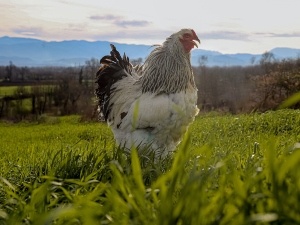
A bird with wry neck can be pretty hard to watch, this condition develops because of a vitamin deficiency in your bird, namely, a vitamin E deficiency in your bird.
If you’ve clicked on this article you may be wondering weather nutri-drench can be used to combat this condition, this article looks into it.
Table of Contents
Nutri-drench for wry neck:
Supplementing vitamin E into your bird’s diet will definitely help your bird recover from this condition. This is how Nurti-drench can help:
What is wry neck?
Wry neck, otherwise called, stargazing, crook neck, torticollis, or twisted neck, is a condition that causes birds to look up as though they are staring at the sky, this is where the condition got its name.
This condition is caused by a lack of vitamin E, and a lack of the mineral selenium, in a bird’s diet.
It is said that certain chicken breeds, like silkies and Polish chickens, are more at risk of developing wry neck because of their tendencies to develop head injuries, wry neck can also be genetic.
How can nutri-drench help?
Nutri-drench is a supplement that is loaded with a variety of nutrients, including vitamin E, making it an excellent solution to your bird’s wry neck
Giving the bird Nutri-drench using a q-tip is an easy and convenient way to deliver this vitamin to the bird’s body, if the bird isn’t opening her mouth.
If the bird doesn’t want to eat you can place the Nutri-drench-soaked q-tip by her beak to get her to open up. The bird will feel the moisture at her beak and open her mouth to eat.
You can also place vitamin E tabs directly into the bird’s mouth as a method of treating the birds wry neck.
You’ll likely see some improvements after about 2 days of constantly giving the bird Nutri-drench. You can serve this medicine 2 or 3 times a day
You’d need to isolate the bird during the time that you give the bird the Nutri-drench. This will allow the bird to recover without other birds pecking at it out of curiosity.
Make sure to give the bird its own food and water while in isolation and keep her overall stress levels low.
If you enjoyed this article then you may also be interested in other chicken related articles. Here are some articles that you may be interested in: Chicken Comb Looks Dry, Chicken Feathers Look Frayed, Rooster Walking Backwards

